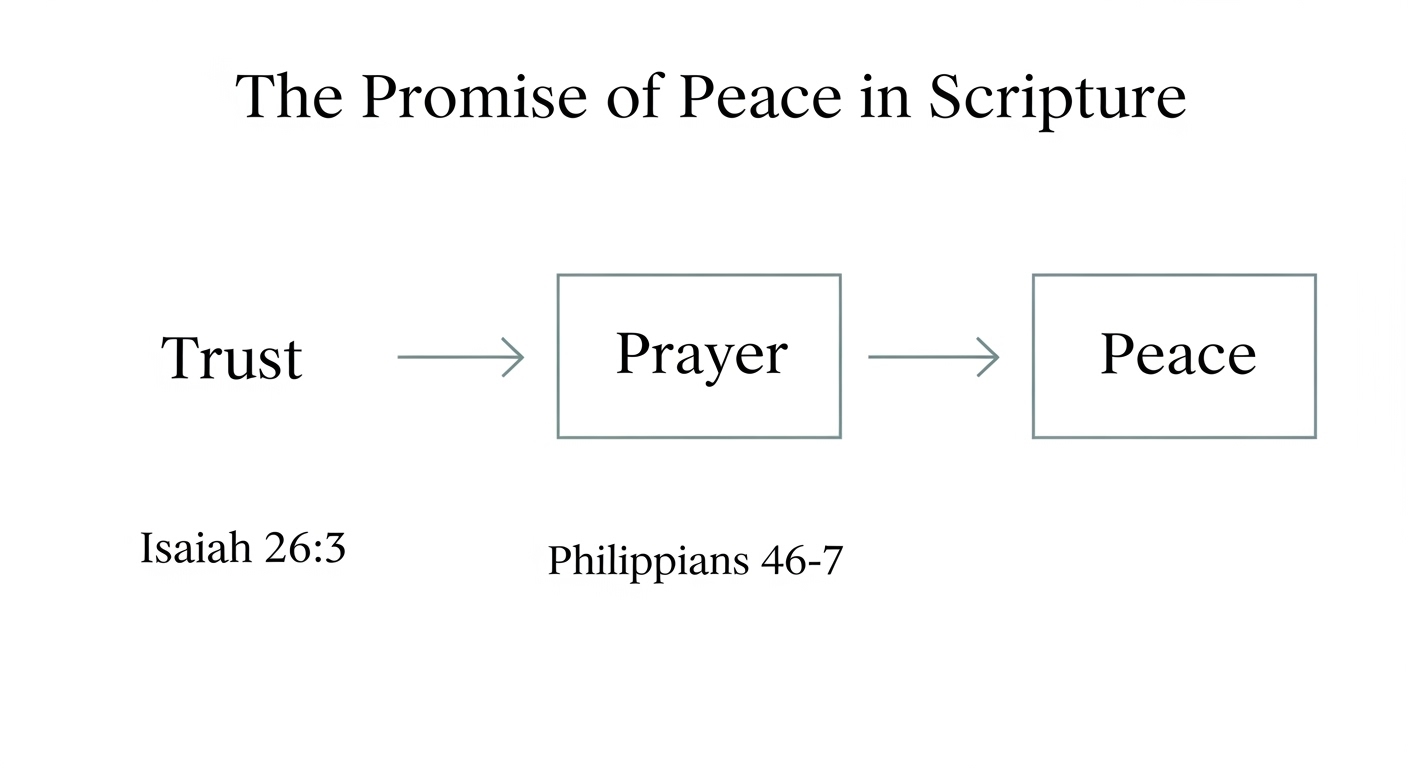How To Pray For Peace When Your Mind Feels Overwhelmed

You’re reading this because your mind is noisy. Maybe your thoughts spiral when you lie down at night, or deadlines, relationships, or news cycles keep your chest tight. You want to know how to pray for peace — not just feel briefly calmer, but find an inner steadiness that outlasts a wave of anxiety. This article is practical and gentle: a simple prayer framework built on scripture, short prayers you can use immediately, and everyday habits that help you hold peace even when your mind feels overwhelmed.
You don’t have to perform a perfect prayer. You just need a path to bring your worry to God and to receive His calming presence. Throughout this article, you’ll find biblical references you can follow up on, and I’ll point you to trusted scripture links so you can read the passages in context. If you’re ready, let’s walk through what it means to pray for peace, why Scripture points you to God for rest, and how to put prayer into practice when your mind is racing.
Why You Need a Simple Framework for Prayer
When your mind is overwhelmed, prayer can feel hard — not because God is distant, but because your thoughts are scattered. A simple framework helps you focus. It gives you a path to follow when your words fail and when feelings overpower thought. A framework also helps you anchor your prayer in scripture, so you’re not simply asking for calm but inviting the truth of God’s promises into your restless places.
Think of the framework as a small map: pause, bring your worry, remind yourself of God’s promises, surrender control, and thank Him. Each step lines up with Scripture and is something you can repeat any time. You’ll learn this framework below and see example prayers that match each part, so you can practice how to pray for peace with clarity and confidence.
What Biblical Peace Really Means
When you ask how to pray for peace, it helps to know what the Bible means by “peace.” Biblical peace — shalom — is more than the absence of conflict. It’s a wholeness and completeness that touches your mind, emotions, relationships, and soul. It doesn’t always mean your external circumstances change instantly, but it does mean God’s presence steadies you inside, giving clarity and rest even amid chaos.
Jesus offered this kind of peace when He said, “Peace I leave with you; my peace I give you. I do not give to you as the world gives.” Read the full verse here: John 14:27. When you ask how to pray for peace, remember that you’re not asking for a human-level calm but asking to receive the peace Jesus promises — a peace that coexists with struggle.
The Promise of Peace in Scripture

Several passages give you concrete promises to hold onto when you’re learning how to pray for peace. One powerful promise is this: “You will keep in perfect peace those whose minds are steadfast, because they trust in you.” See it in context: Isaiah 26:3. That verse shows that peace is connected to trusting God and redirecting your mind to Him.
Another clear promise appears in Paul’s words to a worried church: “Do not be anxious about anything, but in every situation, by prayer and petition, with thanksgiving, present your requests to God. And the peace of God… will guard your hearts and your minds in Christ Jesus.” Read the passage here: Philippians 4:6-7. This gives you a practical rhythm when you ask how to pray for peace: prayer + thanksgiving = peace that guards your heart and mind.
Why Your Mind Feels Overwhelmed
You might know why you’re overwhelmed: a heavy workload, family responsibilities, loss, or health worries. Other times, the cause is less obvious — chronic stress, poor sleep, or relentless comparison on social media. When your mind is overwhelmed, cortisol and adrenaline can hijack your thinking, making prayer feel distant and your thoughts replay anxieties like a broken record.
Understanding the sources helps you approach how to pray for peace more wisely. Some worries demand action — bills, calls to make, decisions to take. Other worries are about things outside your control. Prayer helps on both fronts: it guides you toward what you can change and invites God’s presence into what you cannot. Recognizing which is which will steady your prayer life and make your requests clearer.
How Stress Changes the Way You Pray
When you’re stressed, your prayers may become repetitive, urgent, and centered on crisis management. That’s understandable. But stress can also shorten your attention span and make it harder to sit in silence or reflect on Scripture. The framework you’ll learn here is designed to fit those shorter attention spans. It gives you simple, repeatable phrases and scriptures so you can practice how to pray for peace even when you have only a few minutes.
Remember: God hears the simple cries of a tired heart as much as He hears elaborate prayers. The goal isn’t eloquence; it’s connection. Scripture assures you that God’s comfort is available in your distress: “The LORD is close to the brokenhearted and saves those who are crushed in spirit.” See it here: Psalm 34:18. Lean on that promise as you learn to pray for peace.
A Simple Prayer Framework You Can Use (Step-by-Step)
When you ask how to pray for peace, a simple framework helps you move from scattered worry to steady prayer. Use these five steps in any order that feels natural; you can move through them in five minutes or twenty.
- Pause and Breathe — Physically slow your breathing and invite God’s presence.
- Bring Your Worry — Name the worry aloud or in your journal.
- Remember God’s Promises — Speak a Scripture that addresses your fear.
- Surrender and Trust — Offer control to God and ask for His peace.
- Thank and Rest — End with thanksgiving and a short moment of silence.
Each step has scriptural anchors and example phrases you can use. This framework is designed so you can say it, whisper it, or journal through it. The important part is repetition — over time, this becomes your default way to pray when your mind spins.
Step 1 — Pause and Breathe
When your mind races, your body often follows. Pause intentionally. Close your eyes if you can and take three slow breaths: inhale for four counts, hold for two, exhale for six. This simple breathing pattern calms your nervous system and prepares your mind to pray.
The Bible invites stillness before God: “Be still, and know that I am God.” Read this encouragement here: Psalm 46:10. Being still doesn’t mean you’ve fixed the situation; it means you’re repositioning yourself to see God’s presence in the middle of it.
Step 2 — Bring Your Worry

Name your worry plainly. You can say it silently, write it down, or speak it aloud: “I’m anxious about the job interview,” “I’m exhausted,” “I’m afraid for my child.” Bringing your worry to God creates space between you and the fear.
Paul’s instruction connects directly: “In every situation, by prayer and petition, with thanksgiving, present your requests to God.” See it here: Philippians 4:6. You’re not hiding what you feel; you’re handing it over.
Step 3 — Remember God’s Promises (Use Scripture)
Bring Scripture into your prayer. Select a verse that speaks to peace and repeat it back to God. For example, say or meditate on Isaiah’s promise: “You will keep in perfect peace those whose minds are steadfast, because they trust in you.” See the verse: Isaiah 26:3.
Another helpful promise is Jesus’ offer of rest: “Come to me, all you who are weary and burdened, and I will give you rest.” Read the passage here: Matthew 11:28-30. When you physically recite scripture, it helps replace anxious narratives with God’s truth.
Step 4 — Surrender and Trust
Surrendering doesn’t mean passivity; it means transferring the heavy emotional load to God and aligning your will with His. You might pray: “Lord, I can’t carry this. I surrender this fear, this decision, this outcome. Please help me trust You.”
Paul comforts the church with the imagery of God’s peace guarding your mind: “[The peace of God] will guard your hearts and your minds in Christ Jesus.” See it here: Philippians 4:7. Trust is often an action rather than a feeling — you act by praying and obeying, even if your emotions lag.
Step 5 — Thank and Rest
End with thanksgiving. Gratitude transforms your posture from demand to trust. You don’t need to be grateful for the problem, but you can be grateful for God’s presence in it. Paul explicitly instructs thanksgiving as part of the path to peace: “In every situation, by prayer and petition, with thanksgiving, present your requests to God.” See it: Philippians 4:6.
Finish by resting — a short silence, a breathing exercise, or a song that reminds you of God’s care. Often, the simple act of pausing after prayer lets the Holy Spirit work in ways your words can’t control.
Practical Short Prayers You Can Use Right Now
When you ask how to pray for peace and your mind is overwhelmed, short prayers are powerful. They’re easy to repeat and anchor your thoughts. Here are a few you can say any time, anywhere.
- “Lord, fill me with Your peace. Guard my thoughts and calm my heart.” (Rooted in Philippians 4:6-7.)
- “Jesus, I bring this worry to You. Help me rest in Your promises.” (Inspired by Matthew 11:28-30.)
- “God, remind me that You are with me; I do not have to be afraid.” (Connected with Psalm 23:1-4.)
- “Holy Spirit, guide my thoughts to what is true and good.” (Reflects Philippians 4:8.)
- “Father, I cast this anxiety on You because You care for me.” (Based on 1 Peter 5:7.)
Say the ones that fit your moment. These short prayers function like anchors, pulling you back to God when your mind drifts. You can repeat them silently while commuting, waiting in line, or right before sleep.
When You Feel Like Prayer Isn’t Working

Sometimes you’ll pray and still feel chaotic. That’s not failure. Prayer is often work beneath the surface: a transformation that God is doing slowly. If you don’t feel immediate change, keep practicing the framework. Keep bringing your worries to God, and consider adding spiritual practices like Scripture memorization, worship music, silence, and communal prayer.
Paul reminds you that God’s comfort can come through people: “Praise be to the God and Father of our Lord Jesus Christ, the Father of compassion and the God of all comfort, who comforts us in all our troubles…” See the passage here: 2 Corinthians 1:3-4. Sometimes peace is mediated through a friend, a counselor, a pastor, or a small group listening with you. Don’t isolate when you need help.
Practical Tools to Support Your Prayer Life
Beyond short prayers and the five-step framework, you can adopt small, practical tools to help your mind settle:
- Create a short list of 3–5 scripture verses to memorize.
- Keep a prayer journal where you write worries and later record answers.
- Use a simple breathing or grounding routine before prayer.
- Set a consistent time — even five minutes in the morning or before bed helps.
These tools make it easier to answer the question of how to pray for peace. They reduce friction and create habits so prayer becomes your default response instead of worry.
How To Pray For Peace for Someone Else
Praying for someone else is a loving response and a way to practice intercession when your own mind is restless. Begin the same way: pause, name the person and their need, and bring Scripture into your prayers. You might say: “Lord, please give [name] peace and strengthen them with Your presence. Guard their mind and sustain their heart.”
Paul’s blessing can be adapted into an intercessory prayer: “May the God of hope fill [name] with all joy and peace as they trust in You, so that they may overflow with hope by the power of the Holy Spirit.” Read it: Romans 15:13. Praying for someone else also helps remove your attention from your own worry and invests it in love.
Short Intercessory Prayers You Can Use
When asking how to pray for peace for someone else, try these concise prayers:
- “Lord, surround [name] with Your peace and presence.”
- “God, give [name] rest for their mind and clarity for their decisions.”
- “Holy Spirit, comfort and steady [name] in this uncertain season.”
These prayers are simple but specific. Remember to follow up in practical ways — a phone call, a note, or a meal — because God often uses people to deliver peace.
Dealing with Persistent or Severe Anxiety
If your mind is persistently overwhelmed or you experience severe anxiety that impairs daily functioning, combine spiritual care with professional help. Prayer and Scripture are vital, but God also provides skilled caregivers: counselors, therapists, and medical professionals who can partner with your faith to bring healing.
The church isn’t meant to replace medical care. God often heals through medicine and therapy. Combining prayer with professional guidance is wise stewardship of your health. If you’re unsure where to start, ask a trusted pastor or search for Christian counselors in your area.
Daily Habits That Protect Your Peace
Prayer is one pillar of peace; daily habits are the others. These aren’t magic fixes, but they make it easier to sustain a peaceful mind:
- Sleep: Prioritize rest when possible.
- Boundaries: Limit media and set healthy limits on work and social media.
- Movement: Gentle exercise and fresh air clear thinking.
- Scripture: Keep short verses handy for quick reorientation (try Philippians 4:8 or Isaiah 26:3).
- Community: Stay connected with people who care and pray with you.
These habits create an environment where prayer for peace can take root and grow. They’re practical ways of saying to God: “I’m cooperating with You to steward the life You’ve given me.”
A Longer Example Prayer You Can Use Tonight
If you want a fuller prayer to pray tonight, here’s a gentle template you can adapt. Read it slowly and let each sentence sink in.
“Father, tonight my mind feels heavy and my thoughts won’t quiet. I pause and breathe, trusting that You are present. I bring these worries to You — [name the worries]. I remember Your promise that You will keep in perfect peace those who trust in You (Isaiah 26:3). Jesus, You said to come to You if I am weary, and You would give me rest (Matthew 11:28-30). Holy Spirit, guard my mind and align my thoughts with what is true and good (Philippians 4:8). I surrender this fear to You now. Thank You that Your peace can guard my heart and mind in Christ Jesus (Philippians 4:7). Amen.”
Pray it slowly, and if your mind wanders, return to one sentence or one verse. Repetition is a friend of transformation.
What to Do in the Middle of the Night
Nighttime can be the hardest because thoughts feel louder in the dark. Use very short prayers and physical techniques to interrupt the spiral: get out of bed and write your worry on paper, pray a single verse, or do a breathing pattern that activates relaxation.
You can also use a speech-based prayer: say aloud, “Lord, I cast this worry on You” (inspired by 1 Peter 5:7) or repeat Jesus’ words: “Do not let your hearts be troubled nor afraid” (John 14:27). These short anchors can break a cycle and help you return to sleep more quickly.
When You Don’t Know What to Pray
If you don’t have the words, the Spirit intercedes on your behalf. Paul reminds you that the Spirit helps in your weakness and intercedes with groans that words cannot express. See the passage here: Romans 8:26. You can rest in God’s help even when you can’t form a full prayer.
Practical step: breathe, say a single word like “Peace,” and let the Spirit shape your heart. You don’t need a perfect prayer to receive God’s presence.
Final Encouragements
Learning how to pray for peace is a journey, not a single act. The more you practice, the more natural it becomes. Be kind to yourself during the process; progress can be slow but steady. Remember that God meets you in the small, honest prayers of a weary heart.
You’re not alone. God’s promises are tangible: He comforts, sustains, and gives peace beyond understanding. Lean on those promises, use the simple framework here, and don’t hesitate to reach out for help when you need it.

Explore More
For further reading and encouragement, check out these posts:
👉 7 Bible Verses About Faith in Hard Times
👉 Job’s Faith: What We Can Learn From His Trials
👉 How To Trust God When Everything Falls Apart
👉 Why God Allows Suffering – A Biblical Perspective
👉 Faith Over Fear: How To Stand Strong In Uncertain Seasons
👉 How To Encourage Someone Struggling With Their Faith
👉 5 Prayers for Strength When You’re Feeling Weak

📘 Jesus and the Woman Caught in Adultery – Grace and Mercy Over Judgement
A powerful retelling of John 8:1-11. This book brings to life the depth of forgiveness, mercy, and God’s unwavering love.
👉 Check it now on Amazon 🛒💥
🔥 “Every great message deserves a home online.” 🌍💬🏡
Don’t let your calling stay hidden. Start a Christian blog or website using Hostinger — with 99.9% uptime, a free domain, and SSL, your voice can shine for God’s glory anytime, anywhere.
💥 Begin today. 🛒 Try it RISK-FREE! ✅
✝️ “Your body is God’s temple — care for it with purpose.” 💪💖🏛️
Renew your energy and restore balance naturally. Mitolyn helps support a healthy metabolism, giving you the vitality to live out God’s calling with strength and confidence.
🔥 Unlock Your Metabolic Power! ⚡Burn More Calories & Feel Great With Mitolyn. 💪
👉 Start Today. 🚀 Check Price Now. 🛒💰
💰 As a ClickBank & Amazon Affiliate, I earn from qualifying purchases.
📖 Acknowledgment: All Bible verses referenced in this article were accessed via Bible Gateway (or Bible Hub).
🚀 Want to explore more? 👉 Dive into our new post on Why Jesus? and experience the 🔥 life-changing truth of the Gospel!






